Exploring LGBT Issues: A Cultural Research Approach Analysis
VerifiedAdded on 2023/06/12
|7
|1473
|492
Essay
AI Summary
This essay provides an analysis of traditional versus culturally relevant research approaches, particularly in the context of the LGBT community. It begins by describing traditional research methods, including quantitative, qualitative, mixed methods, and participatory/advocacy approaches, highlighting their underlying epistemologies and objectives. It then defines culturally relevant research, emphasizing its importance in ensuring applicability and adaptability to the social, linguistic, and cultural needs of the LGBT population. The essay evaluates three research studies addressing the LGBT community, focusing on methodological reflections, attitudes within the Black community towards homosexuality, and the concept of multiple identities. It contrasts traditional research with culturally relevant research, noting the latter's participatory model and collaborative knowledge production. Furthermore, it discusses the relationship between culturally relevant research and the promotion of social justice for the LGBT community, emphasizing empowerment and addressing stigma. Finally, it proposes collaborative practices to advocate for appropriate services, including awareness programs and early interventions to combat homophobia and destigmatize homosexuality, leveraging the principles of culturally relevant research.
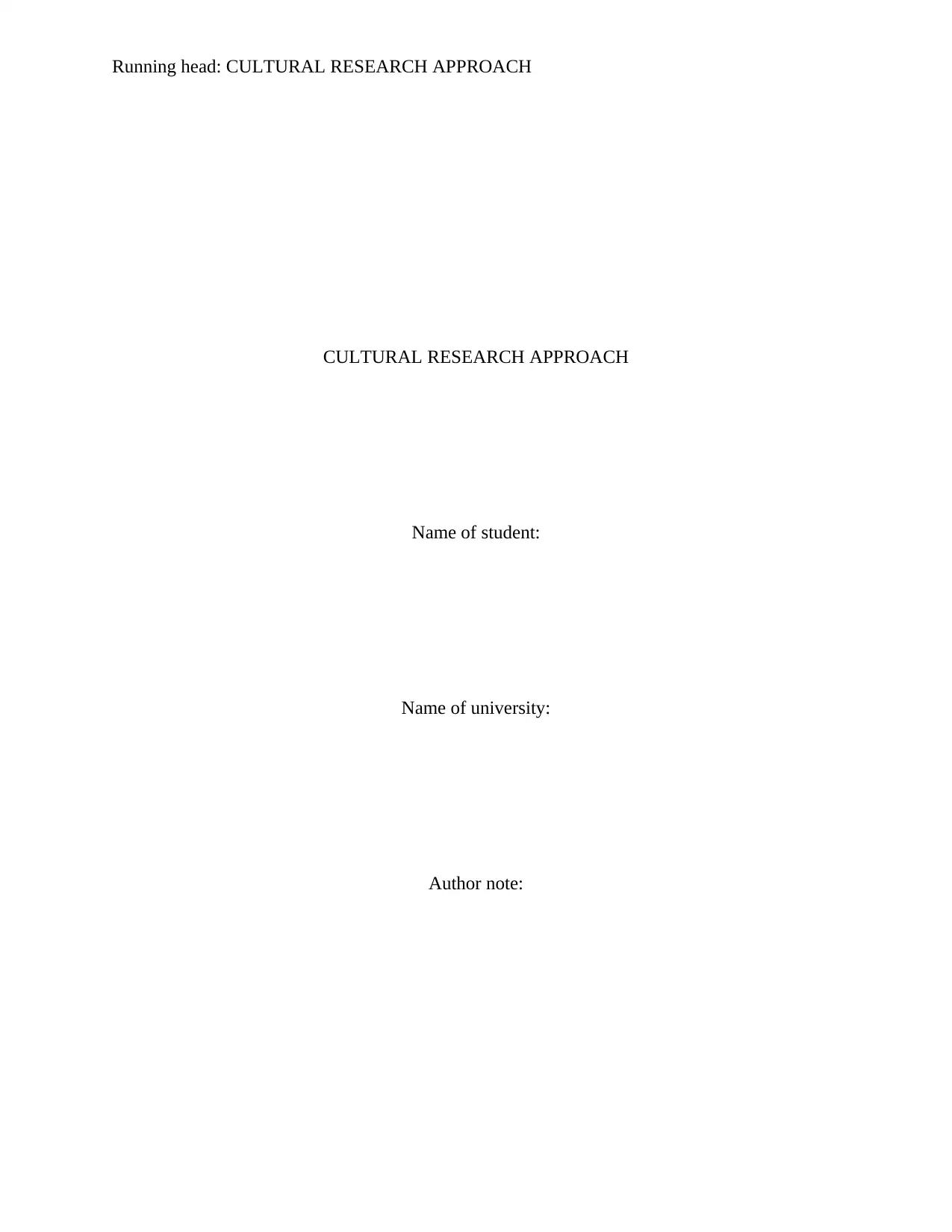
Running head: CULTURAL RESEARCH APPROACH
CULTURAL RESEARCH APPROACH
Name of student:
Name of university:
Author note:
CULTURAL RESEARCH APPROACH
Name of student:
Name of university:
Author note:
Paraphrase This Document
Need a fresh take? Get an instant paraphrase of this document with our AI Paraphraser
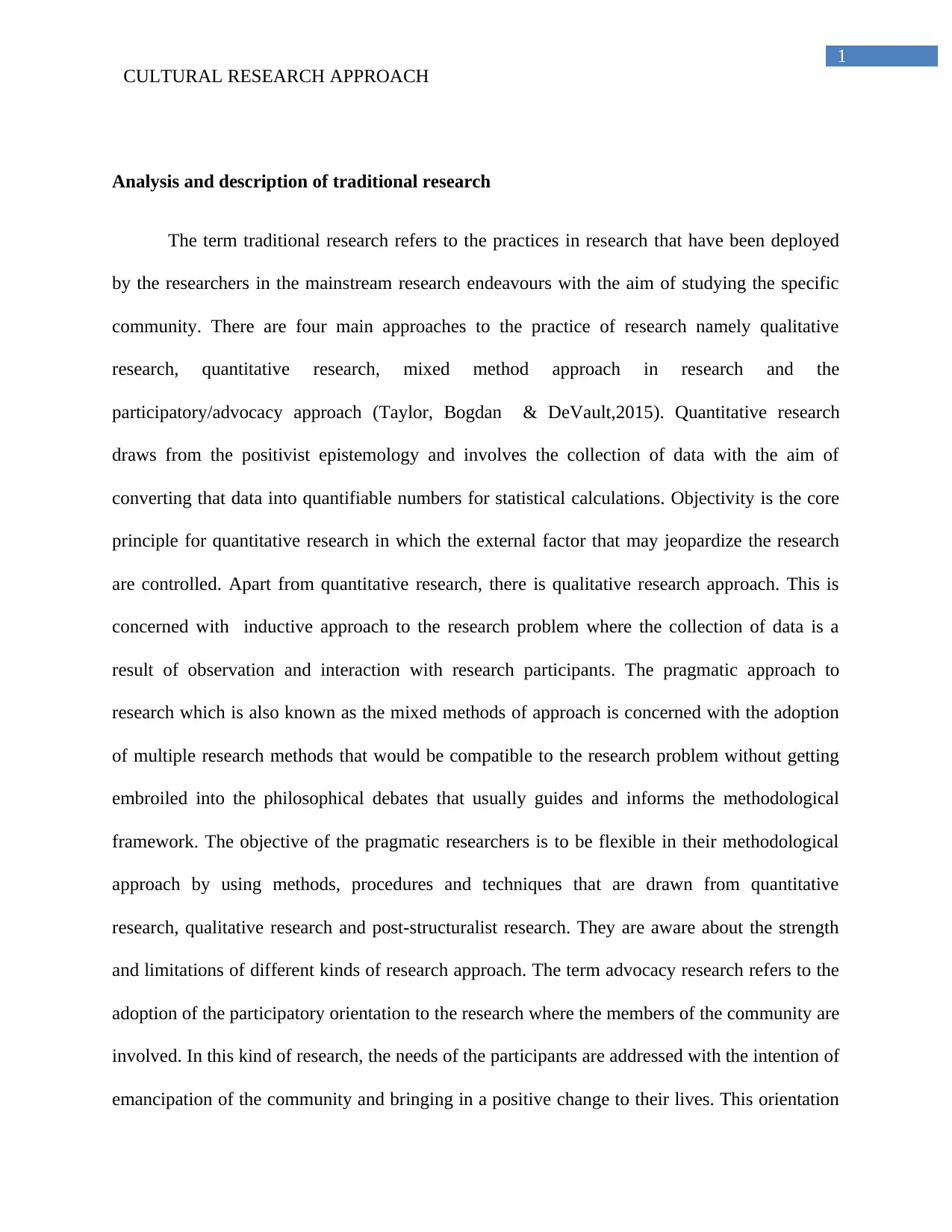
1
CULTURAL RESEARCH APPROACH
Analysis and description of traditional research
The term traditional research refers to the practices in research that have been deployed
by the researchers in the mainstream research endeavours with the aim of studying the specific
community. There are four main approaches to the practice of research namely qualitative
research, quantitative research, mixed method approach in research and the
participatory/advocacy approach (Taylor, Bogdan & DeVault,2015). Quantitative research
draws from the positivist epistemology and involves the collection of data with the aim of
converting that data into quantifiable numbers for statistical calculations. Objectivity is the core
principle for quantitative research in which the external factor that may jeopardize the research
are controlled. Apart from quantitative research, there is qualitative research approach. This is
concerned with inductive approach to the research problem where the collection of data is a
result of observation and interaction with research participants. The pragmatic approach to
research which is also known as the mixed methods of approach is concerned with the adoption
of multiple research methods that would be compatible to the research problem without getting
embroiled into the philosophical debates that usually guides and informs the methodological
framework. The objective of the pragmatic researchers is to be flexible in their methodological
approach by using methods, procedures and techniques that are drawn from quantitative
research, qualitative research and post-structuralist research. They are aware about the strength
and limitations of different kinds of research approach. The term advocacy research refers to the
adoption of the participatory orientation to the research where the members of the community are
involved. In this kind of research, the needs of the participants are addressed with the intention of
emancipation of the community and bringing in a positive change to their lives. This orientation
CULTURAL RESEARCH APPROACH
Analysis and description of traditional research
The term traditional research refers to the practices in research that have been deployed
by the researchers in the mainstream research endeavours with the aim of studying the specific
community. There are four main approaches to the practice of research namely qualitative
research, quantitative research, mixed method approach in research and the
participatory/advocacy approach (Taylor, Bogdan & DeVault,2015). Quantitative research
draws from the positivist epistemology and involves the collection of data with the aim of
converting that data into quantifiable numbers for statistical calculations. Objectivity is the core
principle for quantitative research in which the external factor that may jeopardize the research
are controlled. Apart from quantitative research, there is qualitative research approach. This is
concerned with inductive approach to the research problem where the collection of data is a
result of observation and interaction with research participants. The pragmatic approach to
research which is also known as the mixed methods of approach is concerned with the adoption
of multiple research methods that would be compatible to the research problem without getting
embroiled into the philosophical debates that usually guides and informs the methodological
framework. The objective of the pragmatic researchers is to be flexible in their methodological
approach by using methods, procedures and techniques that are drawn from quantitative
research, qualitative research and post-structuralist research. They are aware about the strength
and limitations of different kinds of research approach. The term advocacy research refers to the
adoption of the participatory orientation to the research where the members of the community are
involved. In this kind of research, the needs of the participants are addressed with the intention of
emancipation of the community and bringing in a positive change to their lives. This orientation
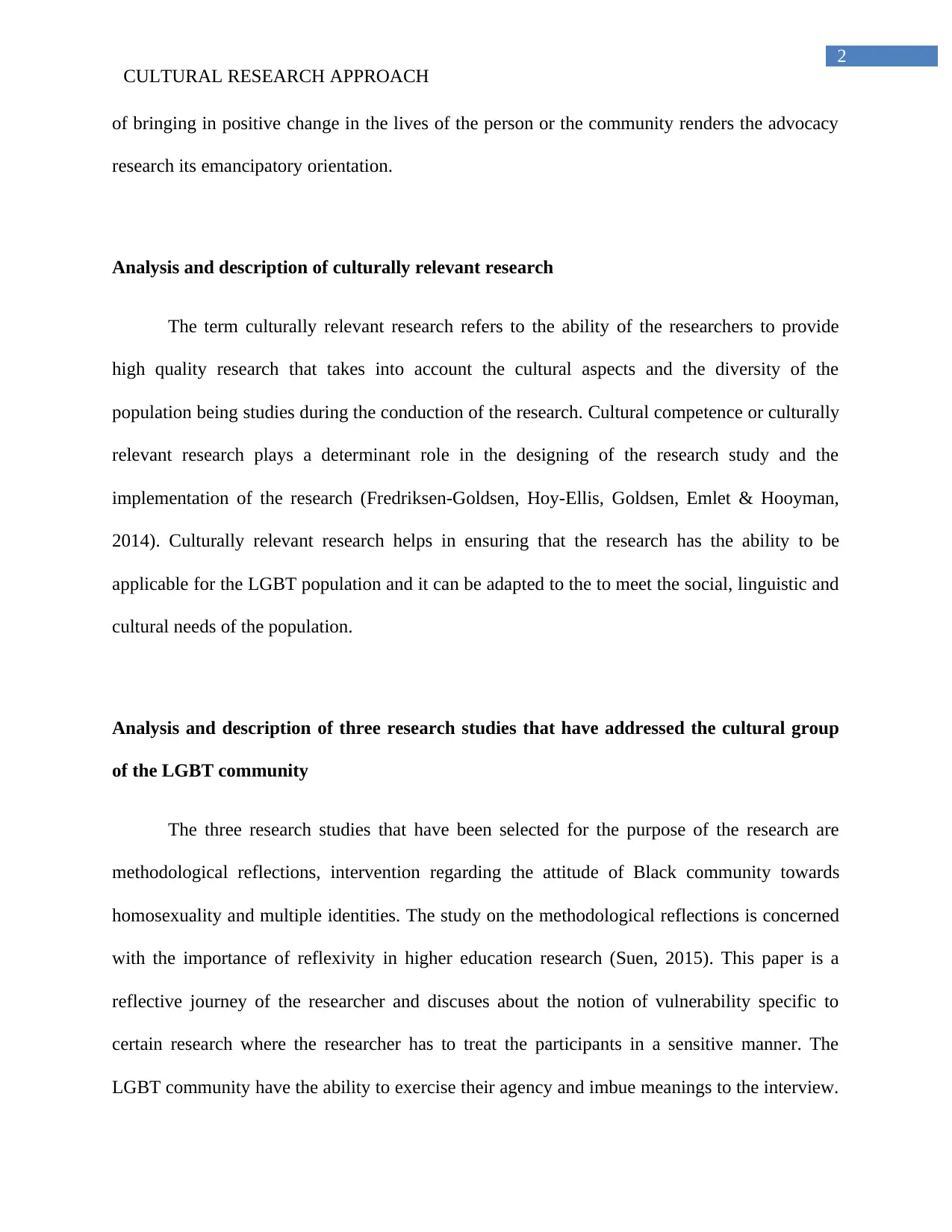
2
CULTURAL RESEARCH APPROACH
of bringing in positive change in the lives of the person or the community renders the advocacy
research its emancipatory orientation.
Analysis and description of culturally relevant research
The term culturally relevant research refers to the ability of the researchers to provide
high quality research that takes into account the cultural aspects and the diversity of the
population being studies during the conduction of the research. Cultural competence or culturally
relevant research plays a determinant role in the designing of the research study and the
implementation of the research (Fredriksen-Goldsen, Hoy-Ellis, Goldsen, Emlet & Hooyman,
2014). Culturally relevant research helps in ensuring that the research has the ability to be
applicable for the LGBT population and it can be adapted to the to meet the social, linguistic and
cultural needs of the population.
Analysis and description of three research studies that have addressed the cultural group
of the LGBT community
The three research studies that have been selected for the purpose of the research are
methodological reflections, intervention regarding the attitude of Black community towards
homosexuality and multiple identities. The study on the methodological reflections is concerned
with the importance of reflexivity in higher education research (Suen, 2015). This paper is a
reflective journey of the researcher and discuses about the notion of vulnerability specific to
certain research where the researcher has to treat the participants in a sensitive manner. The
LGBT community have the ability to exercise their agency and imbue meanings to the interview.
CULTURAL RESEARCH APPROACH
of bringing in positive change in the lives of the person or the community renders the advocacy
research its emancipatory orientation.
Analysis and description of culturally relevant research
The term culturally relevant research refers to the ability of the researchers to provide
high quality research that takes into account the cultural aspects and the diversity of the
population being studies during the conduction of the research. Cultural competence or culturally
relevant research plays a determinant role in the designing of the research study and the
implementation of the research (Fredriksen-Goldsen, Hoy-Ellis, Goldsen, Emlet & Hooyman,
2014). Culturally relevant research helps in ensuring that the research has the ability to be
applicable for the LGBT population and it can be adapted to the to meet the social, linguistic and
cultural needs of the population.
Analysis and description of three research studies that have addressed the cultural group
of the LGBT community
The three research studies that have been selected for the purpose of the research are
methodological reflections, intervention regarding the attitude of Black community towards
homosexuality and multiple identities. The study on the methodological reflections is concerned
with the importance of reflexivity in higher education research (Suen, 2015). This paper is a
reflective journey of the researcher and discuses about the notion of vulnerability specific to
certain research where the researcher has to treat the participants in a sensitive manner. The
LGBT community have the ability to exercise their agency and imbue meanings to the interview.
⊘ This is a preview!⊘
Do you want full access?
Subscribe today to unlock all pages.

Trusted by 1+ million students worldwide
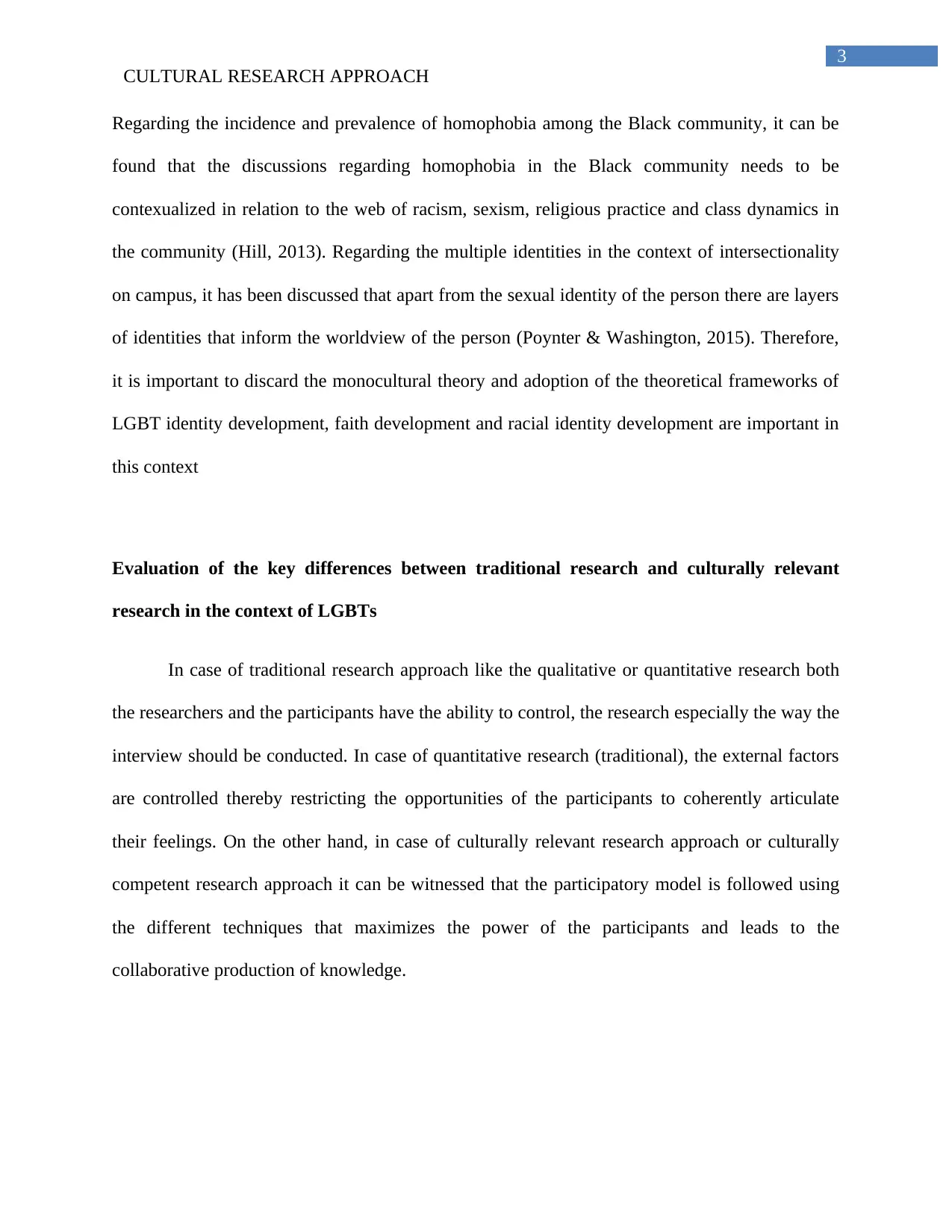
3
CULTURAL RESEARCH APPROACH
Regarding the incidence and prevalence of homophobia among the Black community, it can be
found that the discussions regarding homophobia in the Black community needs to be
contexualized in relation to the web of racism, sexism, religious practice and class dynamics in
the community (Hill, 2013). Regarding the multiple identities in the context of intersectionality
on campus, it has been discussed that apart from the sexual identity of the person there are layers
of identities that inform the worldview of the person (Poynter & Washington, 2015). Therefore,
it is important to discard the monocultural theory and adoption of the theoretical frameworks of
LGBT identity development, faith development and racial identity development are important in
this context
Evaluation of the key differences between traditional research and culturally relevant
research in the context of LGBTs
In case of traditional research approach like the qualitative or quantitative research both
the researchers and the participants have the ability to control, the research especially the way the
interview should be conducted. In case of quantitative research (traditional), the external factors
are controlled thereby restricting the opportunities of the participants to coherently articulate
their feelings. On the other hand, in case of culturally relevant research approach or culturally
competent research approach it can be witnessed that the participatory model is followed using
the different techniques that maximizes the power of the participants and leads to the
collaborative production of knowledge.
CULTURAL RESEARCH APPROACH
Regarding the incidence and prevalence of homophobia among the Black community, it can be
found that the discussions regarding homophobia in the Black community needs to be
contexualized in relation to the web of racism, sexism, religious practice and class dynamics in
the community (Hill, 2013). Regarding the multiple identities in the context of intersectionality
on campus, it has been discussed that apart from the sexual identity of the person there are layers
of identities that inform the worldview of the person (Poynter & Washington, 2015). Therefore,
it is important to discard the monocultural theory and adoption of the theoretical frameworks of
LGBT identity development, faith development and racial identity development are important in
this context
Evaluation of the key differences between traditional research and culturally relevant
research in the context of LGBTs
In case of traditional research approach like the qualitative or quantitative research both
the researchers and the participants have the ability to control, the research especially the way the
interview should be conducted. In case of quantitative research (traditional), the external factors
are controlled thereby restricting the opportunities of the participants to coherently articulate
their feelings. On the other hand, in case of culturally relevant research approach or culturally
competent research approach it can be witnessed that the participatory model is followed using
the different techniques that maximizes the power of the participants and leads to the
collaborative production of knowledge.
Paraphrase This Document
Need a fresh take? Get an instant paraphrase of this document with our AI Paraphraser
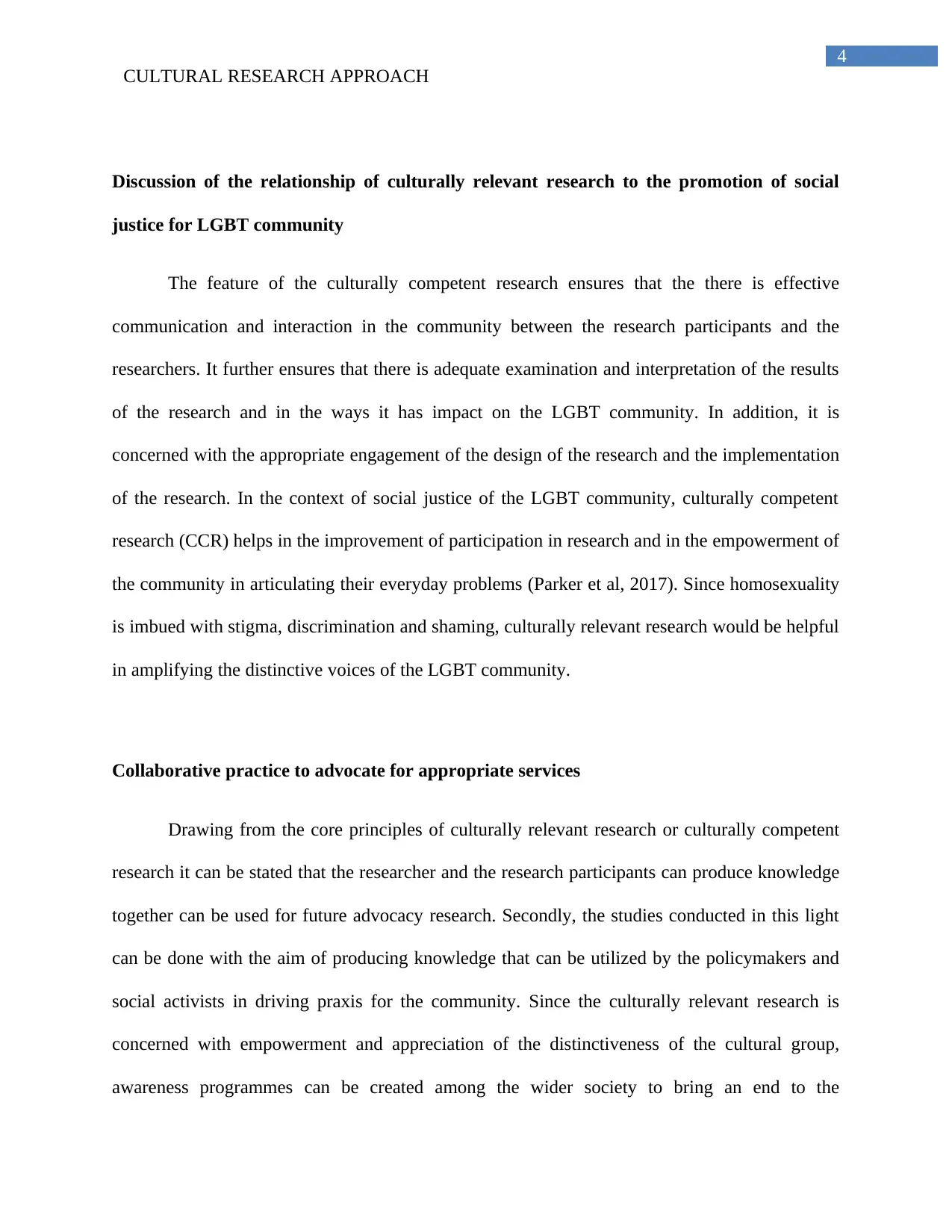
4
CULTURAL RESEARCH APPROACH
Discussion of the relationship of culturally relevant research to the promotion of social
justice for LGBT community
The feature of the culturally competent research ensures that the there is effective
communication and interaction in the community between the research participants and the
researchers. It further ensures that there is adequate examination and interpretation of the results
of the research and in the ways it has impact on the LGBT community. In addition, it is
concerned with the appropriate engagement of the design of the research and the implementation
of the research. In the context of social justice of the LGBT community, culturally competent
research (CCR) helps in the improvement of participation in research and in the empowerment of
the community in articulating their everyday problems (Parker et al, 2017). Since homosexuality
is imbued with stigma, discrimination and shaming, culturally relevant research would be helpful
in amplifying the distinctive voices of the LGBT community.
Collaborative practice to advocate for appropriate services
Drawing from the core principles of culturally relevant research or culturally competent
research it can be stated that the researcher and the research participants can produce knowledge
together can be used for future advocacy research. Secondly, the studies conducted in this light
can be done with the aim of producing knowledge that can be utilized by the policymakers and
social activists in driving praxis for the community. Since the culturally relevant research is
concerned with empowerment and appreciation of the distinctiveness of the cultural group,
awareness programmes can be created among the wider society to bring an end to the
CULTURAL RESEARCH APPROACH
Discussion of the relationship of culturally relevant research to the promotion of social
justice for LGBT community
The feature of the culturally competent research ensures that the there is effective
communication and interaction in the community between the research participants and the
researchers. It further ensures that there is adequate examination and interpretation of the results
of the research and in the ways it has impact on the LGBT community. In addition, it is
concerned with the appropriate engagement of the design of the research and the implementation
of the research. In the context of social justice of the LGBT community, culturally competent
research (CCR) helps in the improvement of participation in research and in the empowerment of
the community in articulating their everyday problems (Parker et al, 2017). Since homosexuality
is imbued with stigma, discrimination and shaming, culturally relevant research would be helpful
in amplifying the distinctive voices of the LGBT community.
Collaborative practice to advocate for appropriate services
Drawing from the core principles of culturally relevant research or culturally competent
research it can be stated that the researcher and the research participants can produce knowledge
together can be used for future advocacy research. Secondly, the studies conducted in this light
can be done with the aim of producing knowledge that can be utilized by the policymakers and
social activists in driving praxis for the community. Since the culturally relevant research is
concerned with empowerment and appreciation of the distinctiveness of the cultural group,
awareness programmes can be created among the wider society to bring an end to the
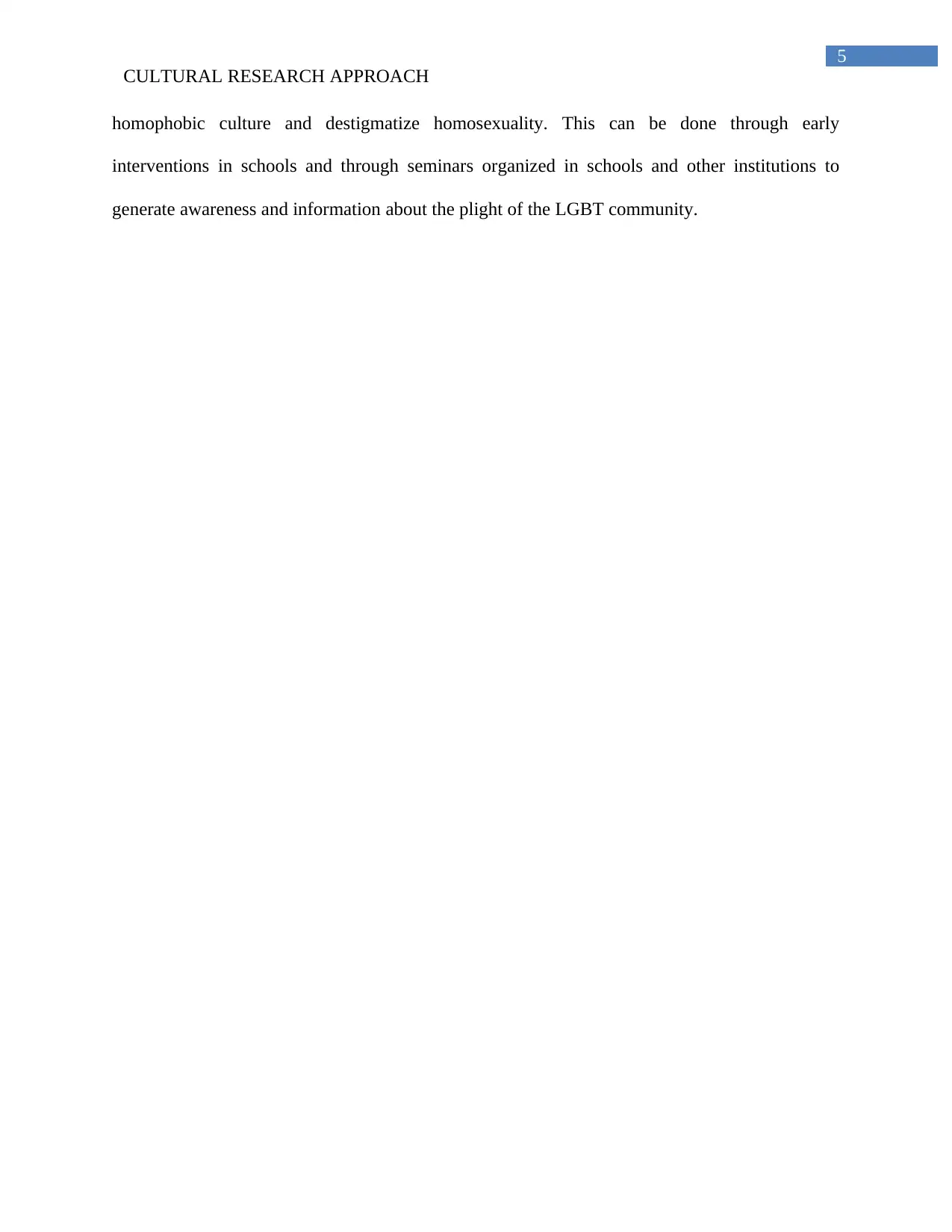
5
CULTURAL RESEARCH APPROACH
homophobic culture and destigmatize homosexuality. This can be done through early
interventions in schools and through seminars organized in schools and other institutions to
generate awareness and information about the plight of the LGBT community.
CULTURAL RESEARCH APPROACH
homophobic culture and destigmatize homosexuality. This can be done through early
interventions in schools and through seminars organized in schools and other institutions to
generate awareness and information about the plight of the LGBT community.
⊘ This is a preview!⊘
Do you want full access?
Subscribe today to unlock all pages.

Trusted by 1+ million students worldwide
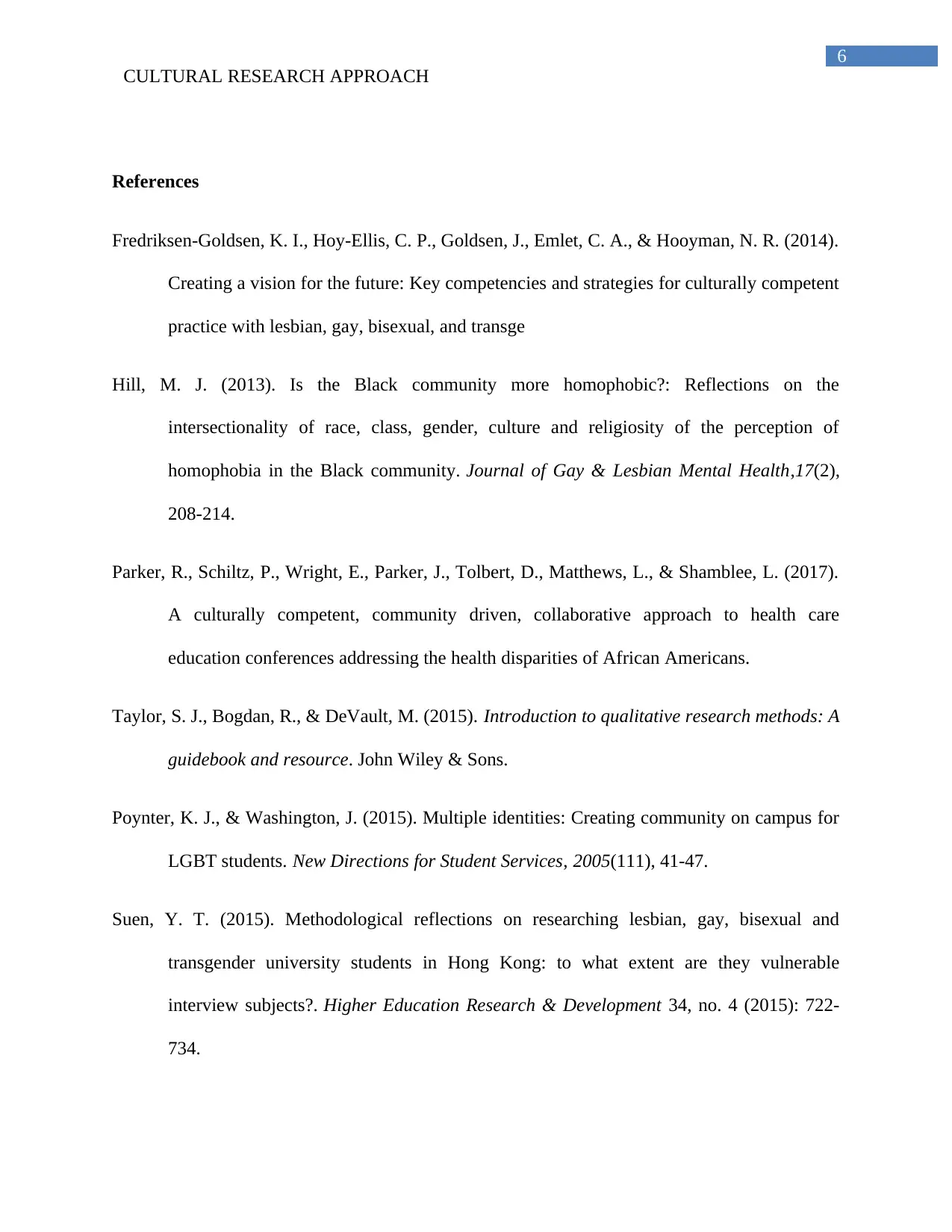
6
CULTURAL RESEARCH APPROACH
References
Fredriksen-Goldsen, K. I., Hoy-Ellis, C. P., Goldsen, J., Emlet, C. A., & Hooyman, N. R. (2014).
Creating a vision for the future: Key competencies and strategies for culturally competent
practice with lesbian, gay, bisexual, and transge
Hill, M. J. (2013). Is the Black community more homophobic?: Reflections on the
intersectionality of race, class, gender, culture and religiosity of the perception of
homophobia in the Black community. Journal of Gay & Lesbian Mental Health,17(2),
208-214.
Parker, R., Schiltz, P., Wright, E., Parker, J., Tolbert, D., Matthews, L., & Shamblee, L. (2017).
A culturally competent, community driven, collaborative approach to health care
education conferences addressing the health disparities of African Americans.
Taylor, S. J., Bogdan, R., & DeVault, M. (2015). Introduction to qualitative research methods: A
guidebook and resource. John Wiley & Sons.
Poynter, K. J., & Washington, J. (2015). Multiple identities: Creating community on campus for
LGBT students. New Directions for Student Services, 2005(111), 41-47.
Suen, Y. T. (2015). Methodological reflections on researching lesbian, gay, bisexual and
transgender university students in Hong Kong: to what extent are they vulnerable
interview subjects?. Higher Education Research & Development 34, no. 4 (2015): 722-
734.
CULTURAL RESEARCH APPROACH
References
Fredriksen-Goldsen, K. I., Hoy-Ellis, C. P., Goldsen, J., Emlet, C. A., & Hooyman, N. R. (2014).
Creating a vision for the future: Key competencies and strategies for culturally competent
practice with lesbian, gay, bisexual, and transge
Hill, M. J. (2013). Is the Black community more homophobic?: Reflections on the
intersectionality of race, class, gender, culture and religiosity of the perception of
homophobia in the Black community. Journal of Gay & Lesbian Mental Health,17(2),
208-214.
Parker, R., Schiltz, P., Wright, E., Parker, J., Tolbert, D., Matthews, L., & Shamblee, L. (2017).
A culturally competent, community driven, collaborative approach to health care
education conferences addressing the health disparities of African Americans.
Taylor, S. J., Bogdan, R., & DeVault, M. (2015). Introduction to qualitative research methods: A
guidebook and resource. John Wiley & Sons.
Poynter, K. J., & Washington, J. (2015). Multiple identities: Creating community on campus for
LGBT students. New Directions for Student Services, 2005(111), 41-47.
Suen, Y. T. (2015). Methodological reflections on researching lesbian, gay, bisexual and
transgender university students in Hong Kong: to what extent are they vulnerable
interview subjects?. Higher Education Research & Development 34, no. 4 (2015): 722-
734.
1 out of 7
Related Documents
Your All-in-One AI-Powered Toolkit for Academic Success.
+13062052269
info@desklib.com
Available 24*7 on WhatsApp / Email
![[object Object]](/_next/static/media/star-bottom.7253800d.svg)
Unlock your academic potential
Copyright © 2020–2026 A2Z Services. All Rights Reserved. Developed and managed by ZUCOL.





